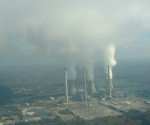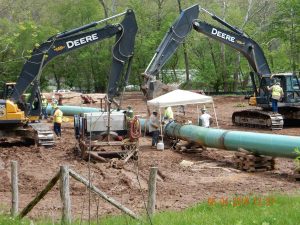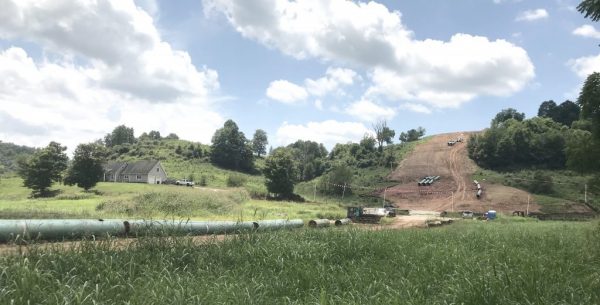
The following is an essay by George Neall, of Rockingham County, VA. It was written on August 6, 2018.
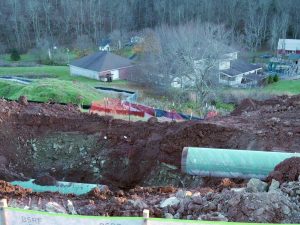
Studies have documented that the construction of gas pipelines can cause the value of properties impacted by the pipelines to decrease an average of more than 30%. Other studies have documented similar decreases in land values caused by fracking. Who pays for these losses? Beyond the decrease in appraised property values, what are some of the other losses that occur as a result of pipeline construction?
There seems to be little useful and publicly available information on getting fairly compensated for the loss of your land, your quiet enjoyment, and other factors if your property is confiscated, despite the fact that condemnation proceedings are not uncommon. You are typically on your own when it comes to this. Most people hire an attorney to represent them in such matters. Finding a knowledgeable attorney who has a successful track record in such cases is very important.
Clearing a pipeline pathway through forested and mountainous land will result in the loss of many tons of topsoil. In one instance (not related to pipeline construction) documented in Texas, 23 tons of topsoil per acre were lost in just one rain event on fairly flat land with a slope of just 4%. Who will pay landowners for the loss of topsoil from their land where pipeline construction will result in the denuding of land? In many areas where the pipeline will be installed, ground slopes exceed 50%. Even after being “reclaimed,” erosion will be astronomical compared to pre-pipeline conditions, especially in forested land.
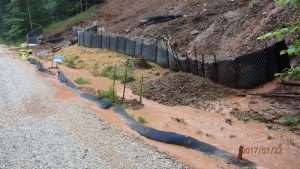 How much would it cost to have topsoil trucked in and spread on the ground to replace the topsoil that was washed away? What thickness of topsoil loss is equivalent to 23 tons per acre? The answer, shown in the simple calculations below, is just 1/8 in! Soil is not renewable in the classical sense. It takes a long time to form. Allowing topsoil to erode from landowners’ properties is akin to stealing money from them. Will we allow topsoil thieves get off scot-free like all of the crooked “too-big-to-fail” bankers?
How much would it cost to have topsoil trucked in and spread on the ground to replace the topsoil that was washed away? What thickness of topsoil loss is equivalent to 23 tons per acre? The answer, shown in the simple calculations below, is just 1/8 in! Soil is not renewable in the classical sense. It takes a long time to form. Allowing topsoil to erode from landowners’ properties is akin to stealing money from them. Will we allow topsoil thieves get off scot-free like all of the crooked “too-big-to-fail” bankers?
The weight of a one-foot thickness of topsoil covering one acre of land area is approximately 4,000,000 lbs. Using 23 tons of topsoil loss per acre, we can calculate how thick this topsoil loss would be:
First, 23 tons/acre x 2,000 lb./ton = 46,000 lb./acre lost from just one rain event
Then, 46,000 lb. soil erosion / 4,000,000 lb./ft. thickness = 0.0115 ft./acre = 0.138 in., a little over 1/8 inch!
In other words, you would not be able to accurately measure soil depth to document this loss. You would actually need to see the topsoil being washed away during or following a rain or observe the gullies and rills left by water that eroded the topsoil to know that erosion had occurred.
Beyond compensation to the landowner for the loss of valuable topsoil, who will pay citizens for the degradation of water, our most precious resource, caused by the erosion of soil into surface and underground water sources? Let’s assume that pipeline construction will result in a total of 23 tons of soil erosion per disturbed acre of land. The actual figure will likely be much greater because most of the land being disturbed by the pipeline will have a slope much greater than 4%, with slopes exceeding 60% in areas. The 23-tons/acre figure was also from just one rainfall, albeit a big one, whereas increased erosion from pipeline construction will continue for many years. The
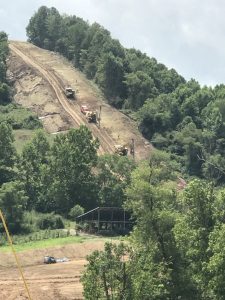
pipeline will result in the denuding of approximately 10,000 acres of land, which would result in more than 200,000 tons of topsoil being washed into our fresh water resources. The rivers and streams carrying this sediment-laden water will eventually carry it to the oceans, further polluting them.
What are trees worth? I’m not a forester. Standing tree values will vary depending upon a lot of factors, but an estimate of $1,500.00/acre can be used for tracts that are commercially clear-cut. Many people who have purchased forested tracts of land for recreational or retirement use would consider their land more valuable with standing timber than without. Indeed, many people looking for recreational or retirement land would not consider purchasing a clear-cut tract or land that was crossed by or adjacent to a large natural gas pipeline.
My wife and I would not sell the timber rights on the land we temporarily own. The timber is more valuable standing than cut down. The timber is what helps produce the pristine spring water we drink and the pure stream that flows down the mountain behind our house. When you really think about it, we’re all “temporary owners” while we’re alive. The land will endure and flourish if we let it. Sooner or later, someone else will temporarily own our land.
Water is not only the most important product of our wooded property but also of the national forests. Pristine water is dependent upon trees. The animals are dependent upon the trees and water. How much is it worth listening to woodpeckers drumming for food or catbirds calling from the trees? Can you assign a worth to collecting black walnuts, hickory, and May apples nuts in the fall? What about wineberries, blackberries, raspberries, blueberries and mulberries in the summer? If you’re a pipeline company that wishes to profit from the resources in our environment, they would have you believe the values of these things are intangible and irrelevant. We all know better!
There are many other factors that need to be considered if you are faced with condemnation of your land for the construction of a natural gas pipeline. Will your mortgage be affected? Will your house/property insurance be affected? What happens if the pipeline pollutes your land? What happens if/when the pipeline is abandoned? How will your use of the land confiscated by the pipeline be limited or adversely affected? How will the pipeline owner ensure the pipeline right of way is kept clear of trees or other objectionable plants? Will they use herbicides or will this be done manually? How often will these or other pipeline activities disrupt the “quiet enjoyment” of your property? What will happen if you lose your water supply as a result of pipeline construction? If your property is near a compressor station, is that station a nuisance, legally?
Here is the dictionary definition of “nuisance”: “Nuisances that interfere with the physical condition of the land include vibration or blasting that damages a house; destruction of crops; raising or lowering of a water table; or the pollution of soil, a stream or underground water supply. Examples of nuisances interfering with the comfort, convenience, or health of an occupant are foul odors, noxious gases, smoke, dust, loud noises, excessive light or high temperatures.”
 Pipeline companies don’t care about any of these “theoretical” considerations. They don’t care about inconveniencing people. They don’t care that their actions may cost other people money or cause emotional pain. They’re not in the business to be nice. They’re in business to make money. They make money by externalizing as many costs as possible, like pollution of our environment. Violations of environmental regulations should result in significant fines. Landowners should receive fair compensation that not only includes the actual value of confiscated land, but also compensation for loss of quiet enjoyment, loss of topsoil and other factors. The cost of mitigating pollution should be paid up front and not by society after is has occurred. If paying environmental costs up front makes the product or project too expensive to generate a profit, it would not happen.
Pipeline companies don’t care about any of these “theoretical” considerations. They don’t care about inconveniencing people. They don’t care that their actions may cost other people money or cause emotional pain. They’re not in the business to be nice. They’re in business to make money. They make money by externalizing as many costs as possible, like pollution of our environment. Violations of environmental regulations should result in significant fines. Landowners should receive fair compensation that not only includes the actual value of confiscated land, but also compensation for loss of quiet enjoyment, loss of topsoil and other factors. The cost of mitigating pollution should be paid up front and not by society after is has occurred. If paying environmental costs up front makes the product or project too expensive to generate a profit, it would not happen.
We may be able to stop some pipelines from being built. This needs to be our collective goal. But there will be instances where pipelines are built in spite of widespread and fervent opposition, science and common sense. Dominion and other corporations pay politicians to do their bidding. They help write the laws that let them run roughshod over you and me.
Suggested further reading:
Finding and Buying Your Place In The Country by Les & Carol Scher
Take heart, take action! Citizen activism helps change the world over time, even when things seem to be sliding backward. We are in it for the long haul. Get involved! Contact OVEC at info@ohvec.org.

